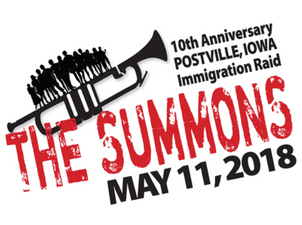
How Will We Answer the Summons?
Rebecca Eastwood
May 9, 2018
Although I have lived in Washington, DC for the past four years and have grown and learned so much in our nation’s capital, I will always be a proud Iowan.
Often confused with places like Ohio or Idaho, Iowa is known for things like corn and caucuses. The events of May 12, 2008, however, permanently marked Iowa on the map for a different reason.
Headlines in the weeks that followed read:
Immigration Raid Jars Small Town
Immigration Raid at Meat Processing Plant in Iowa Largest Ever in US
I was 16 at the time and attended high school in Decorah, IA. When the news reached our classrooms that day of helicopters and federal agents surrounding the meatpacking plant in Postville, the town next door, I was confronted with the reality of our broken immigration system that, because of my privileged background, I never before had to consider.
We would soon learn in the hours and days following that what transpired was the largest worksite immigration raid (at that time) in U.S. history. As I reflect on the events that day ten years ago I recognize it as the moment that truly summoned me to social justice work.
For a town of approximately 2,400, Postville was one of the most diverse communities in Northeast Iowa. In addition to a number of other distinct communities, Postville was home to a large Latino/a population. Drawn by the promise of opportunity, education, and safety, families set down roots in Postville.
The raid tore these roots apart. Immigration and Customs Enforcement agents arrested almost 400 people working at the kosher meatpacking plant, AgriProcessors, in the span of a few hours. Agents descended on the plant, chased, shackled, and carted away mothers, fathers, sisters, and brothers.
Children came home from school to empty houses. Community members took refuge at St. Bridget’s, the local Catholic church, terrified they would be next or that they would never see their family members again. The raid upended the schools, economy, and families of this small community.
In the chaotic weeks following, the local community stepped up to attempt to repair what our federal government had ripped apart. Centered in St. Bridget’s, volunteers helped people find their family members, the majority of whom were detained in the Cattle Congress buildings, prosecuted en masse, and eventually deported.
Through this response effort, I spent some time volunteering, mostly using my high school Spanish to entertain children while their family members did all they could to pull their lives back together.
This experience would never leave me. I could not forget the child asking when they would see their dad again or the mother trying to keep her family fed while wearing an ankle monitor. I was shaken out of my complacency and forced to answer the question: who am I summoned to be in the face of this injustice? Answering that question led me to Washington, DC to advocate for policies that would keep families together and uphold the dignity of migrants- attempting to prevent other communities from experiencing the same trauma as Postville.
The raid seared into our collective memory the devastating impact of inhumane immigration policies. We no longer need to look back a decade, however, to remember the suffering caused by immigration raids.
Only one month ago, ICE conducted the largest worksite raid of the Trump administration. The circumstances were all too familiar: agents surrounded a meatpacking plant in Tennessee. They arrested nearly 100 people. Terrified families gathered at the local Catholic church for support.
In the past year, the federal government has targeted thousands for detention and deportation, including those who have lived here for decades. They have systematically rescinded legal status for those with Deferred Action for Childhood Arrivals (DACA) and Temporary Protected Status (TPS). They are separating families seeking safety at our southern border.
Who are we as a nation summoned to be in the face of these injustices? Will we challenge harsh, anti-immigrant rhetoric and policy? Will we demand a system that recognizes migrants as whole persons worthy of dignity? As people around the country observe the ten-year anniversary of the raid we pray that in answering this summons we will never mark another anniversary like this.
Postville is everywhere. How will we respond?
Becca is the Advocacy Coordinator for the Columban Center for Advocacy and Outreach in Washington, DC. The Columban Center is the national advocacy office for the Columban fathers, a Catholic order of priests and lay missionaries living and serving in 15 countries. Her advocacy work focuses on immigration, environmental, and economic policy.







